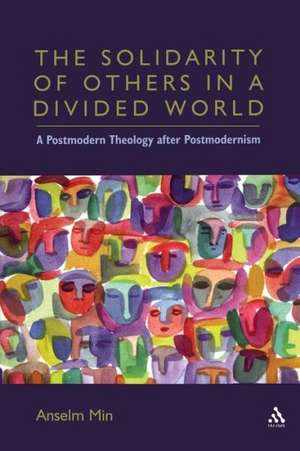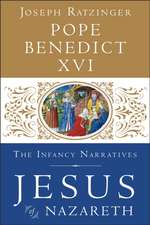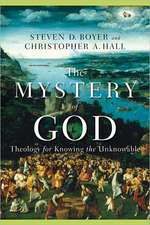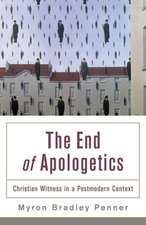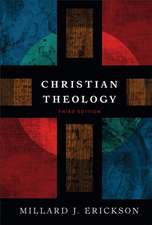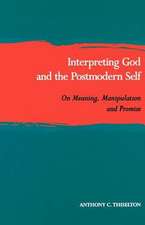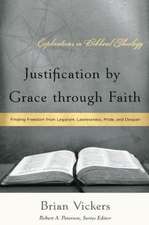The Solidarity of Others in a Divided World: A Postmodern Theology after Postmodernism
Autor Anselm Kyongsuk Minen Limba Engleză Paperback – 31 mai 2004
Preț: 299.29 lei
Preț vechi: 365.62 lei
-18% Nou
Puncte Express: 449
Preț estimativ în valută:
57.27€ • 61.24$ • 47.75£
57.27€ • 61.24$ • 47.75£
Carte tipărită la comandă
Livrare economică 17 aprilie-01 mai
Preluare comenzi: 021 569.72.76
Specificații
ISBN-13: 9780567025708
ISBN-10: 0567025705
Pagini: 256
Dimensiuni: 158 x 229 x 16 mm
Greutate: 0.41 kg
Editura: Bloomsbury Publishing
Colecția T&T Clark
Locul publicării:New York, United States
ISBN-10: 0567025705
Pagini: 256
Dimensiuni: 158 x 229 x 16 mm
Greutate: 0.41 kg
Editura: Bloomsbury Publishing
Colecția T&T Clark
Locul publicării:New York, United States
Recenzii
Min negociates difficult terrain gracefully: in the name of difference...What I appreciate most of all in this developing argument is Min's commitement to action against oppression and hs refusal to allow theology and philosophy to be lost in abstractions.... ...What this book does is once again to harness key Christian doctrines to the priority of justice-making. It offers a means of bringing the concerns of liberation theology - if not its method - to the centre of theological concern, and gives us a way to chart our way through the difficult territory of diversity and threatening otherness, never losing sight of the fact that suffering communities and not abstract argument are our concern. It will be a valuable resource across the boundaries of theological disciplines.' ~ Mary Grey, International Journal of Systematic Theology, Vol. 8, Number 3, July 2006
Faithful both to the violent context and the needs of justice, Min admits the fact of conflict within the religions, and, refusing the extremes of absolutism and relativism, proposes a diapraxis that is more than mere dialogue and a dialectic pluralism that develops the historical dialectic inherent in the interaction of plural religions (p.174).
Min negotiates difficult terrain gracefully: in the name of difference, he denounces all tendencies to totality, universalism and unchanging essences emphasizing the strength of postmodernism as the commitment to justice and calling for a 'heterological imperative' or a willingness to subject our convictions to the challenge, views and identities of others (p.62).
"With customary clarity and depth Anselm Min explores the implications of postmodernism, in particular the thought of Levinas and Derrida, for doing theology today. In the process Min brings to bear his notion of "solidarity of others" on a postmodern pneumatology and christology. What emerges is a fresh and challenging voice in liberation theology which has been the author's longstanding concern. We all owe a great debt of gratitude to Min's ground-breaking theology, not least for his eloquent voice from the Korean-American perspective."--Dr. Peter C. Phan, Ignacio Ellacuria, S.J., Professor of Catholic Social Thought, Georgetown University
"Through a sympathetic critique of postmodernism, Anselm Min offers a new kind of postmodern theology that seeks an appropriate balance between the infinity of human dignity, the construction of appropriate social and religious totalities, and the solidarity of others in liberating praxis. He warns against the temptation to avoid the hard labor of history, which is rendered more complicated by global contact among those who are other to each other. With its focus on the solidarity-creating movement of the Holy Spirit in the world, this is engaged theology at its best."--Peter C. Hodgson, Charles G. Finney Professor of Theology, Emeritus, Divinity School, Vanderbilt University
"Anselm Min's The Solidarity of Others in a Divided World is a remarkable achievement. The deft ease with which the author integrates theology, postmodernism, biblical exegesis and cultural criticism is fresh and invigorating. This is an original, coherent, and beautifully written argument for the need to sublate the postmodern interest in difference with the wider social concern of solidarity with others. The reality of globalization has both brought diverse peoples together and highlighted our differences based on religion, culture, and ideology. Min offers a fresh rethinking of God as a trinitarian celebration of equality and friendship as the basis for reimagining how we can live together even though we are fundamentally different from one another. Written with stylistic verve and keen theological insight, The Solidarity of Others in a Divided World makes a compelling case for creating just and sustainable living conditions for all human societies based on the rich, classical heritage of Christian social teaching."--Mark I. Wallace, Department of Religion, Swarthmore College.
"Let me be immediately clear about my enthusiasm for this book. Anyone interested in the challenges of religious pluralism and interrelations dialogue will profit immensely from it...flows coherently and engagingly." -Theological Studies, June 2005
'notable for its clearheaded balance as much as its engagement with real issues of life in a concrete, historical world...most chapters are intelligible by themselves, and many convey the heart of the argument from their various perspectives without the need to read or understand the whole book in order to grasp it'
Faithful both to the violent context and the needs of justice, Min admits the fact of conflict within the religions, and, refusing the extremes of absolutism and relativism, proposes a diapraxis that is more than mere dialogue and a dialectic pluralism that develops the historical dialectic inherent in the interaction of plural religions (p.174).
Min negotiates difficult terrain gracefully: in the name of difference, he denounces all tendencies to totality, universalism and unchanging essences emphasizing the strength of postmodernism as the commitment to justice and calling for a 'heterological imperative' or a willingness to subject our convictions to the challenge, views and identities of others (p.62).
"With customary clarity and depth Anselm Min explores the implications of postmodernism, in particular the thought of Levinas and Derrida, for doing theology today. In the process Min brings to bear his notion of "solidarity of others" on a postmodern pneumatology and christology. What emerges is a fresh and challenging voice in liberation theology which has been the author's longstanding concern. We all owe a great debt of gratitude to Min's ground-breaking theology, not least for his eloquent voice from the Korean-American perspective."--Dr. Peter C. Phan, Ignacio Ellacuria, S.J., Professor of Catholic Social Thought, Georgetown University
"Through a sympathetic critique of postmodernism, Anselm Min offers a new kind of postmodern theology that seeks an appropriate balance between the infinity of human dignity, the construction of appropriate social and religious totalities, and the solidarity of others in liberating praxis. He warns against the temptation to avoid the hard labor of history, which is rendered more complicated by global contact among those who are other to each other. With its focus on the solidarity-creating movement of the Holy Spirit in the world, this is engaged theology at its best."--Peter C. Hodgson, Charles G. Finney Professor of Theology, Emeritus, Divinity School, Vanderbilt University
"Anselm Min's The Solidarity of Others in a Divided World is a remarkable achievement. The deft ease with which the author integrates theology, postmodernism, biblical exegesis and cultural criticism is fresh and invigorating. This is an original, coherent, and beautifully written argument for the need to sublate the postmodern interest in difference with the wider social concern of solidarity with others. The reality of globalization has both brought diverse peoples together and highlighted our differences based on religion, culture, and ideology. Min offers a fresh rethinking of God as a trinitarian celebration of equality and friendship as the basis for reimagining how we can live together even though we are fundamentally different from one another. Written with stylistic verve and keen theological insight, The Solidarity of Others in a Divided World makes a compelling case for creating just and sustainable living conditions for all human societies based on the rich, classical heritage of Christian social teaching."--Mark I. Wallace, Department of Religion, Swarthmore College.
"Let me be immediately clear about my enthusiasm for this book. Anyone interested in the challenges of religious pluralism and interrelations dialogue will profit immensely from it...flows coherently and engagingly." -Theological Studies, June 2005
'notable for its clearheaded balance as much as its engagement with real issues of life in a concrete, historical world...most chapters are intelligible by themselves, and many convey the heart of the argument from their various perspectives without the need to read or understand the whole book in order to grasp it'
